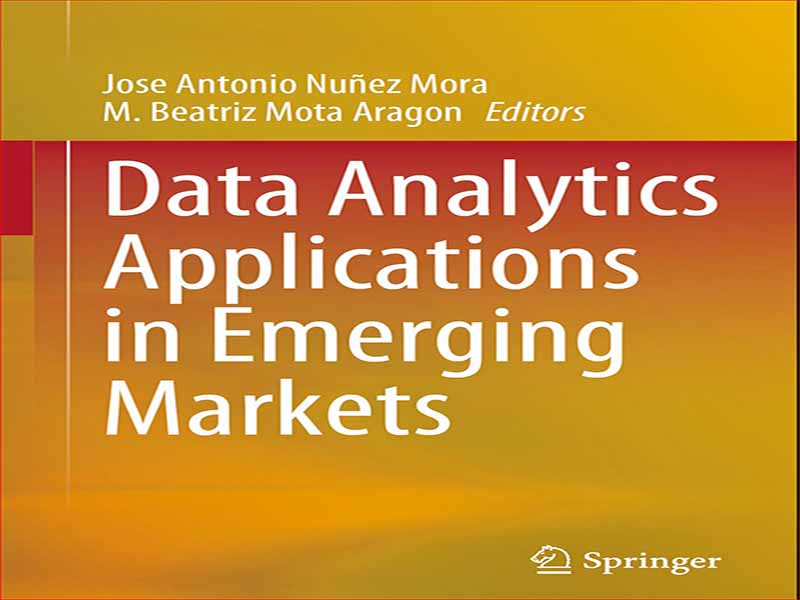- عنوان: Data Analytics Applications in Emerging Markets
- نویسنده: Jose Antonio Nuñez Mora
- حوزه: تحلیل داده
- سال انتشار: 2022
- تعداد صفحه: 209
- زبان اصلی انگلیسی
- نوع فایل: pdf
- حجم فایل: 5.26 مگابایت
هدف این کتاب ارائه دیدگاهی از کاربرد تجزیه و تحلیل داده ها در بازارهای نوظهور است. می توان تأیید کرد که به لطف تکامل فناوری، اکنون است که می توان مشکلات پیچیده را با حجم زیادی از داده ها حل کرد. در ادبیات علمی، پیشرفتهای مهمی در مورد تولید الگوریتمهای متنوع مییابیم که در عین حال، در عمل، زمینهای پربار از کاربردهای ممکن است. ابزارها یا تکنیکهای فعلی مانند داده کاوی، بهینهسازی، یادگیری غیرخطی خودکار، تبدیل دیجیتال، مدلهای GARCH را میتوان برای ساخت برنامههای تحلیلی در این کتاب استفاده کرد که از دادههای فعلی خود برای حل مسائل خاص و توضیح نتایج بر اساس دادههای مالی استفاده میکند. نکته کلیدی ادامه کمک به توسعه تئوری و مدل های مالی است که به عنوان یک عنصر یکپارچه در صفحات این کتاب وجود دارد. این کتاب شامل 9 فصل است که در رابطه با فناوری و انرژی است. اینها یک چارچوب نظری از نوآوری در فناوری مالی و توسعه سرگیجهآور آن در قرن بیست و یکم ارائه میکنند. علاوه بر این، برخی از کاربردها و پیشرفت های انجام شده در اقتصادهای نوظهور را ارائه می دهد. محتوا و جهت خود آن در عنصر یکپارچه این کتاب تشکیل شده است. در فصل اول فنآوریهای مالی در بازارهای نوظهور، پاملا سولداد مونکایو مجیا و پیلار مادرازو لماروی، فینتک را به عنوان بخشی از دنیای نوآوری در فناوری مالی پیشنهاد کردند که رفتار عوامل اقتصادی و تعامل آنها با سیستم های مالی در سراسر جهان با این وجود، آنها اشاره میکنند که فناوری بهطور نامتقارن توسعه یافته است و مورد فینتک مستثنی نیست، از این رو تأکید آنها در مطالعه اقتصادهای نوظهور و تأثیر آنها در اقتصادها است. نویسندگان چالشهای اتخاذ چنین فناوری در این «اکوسیستم»، رسیدگی به پرونده مکزیکی و نزدیک شدن به پیشبرد تأثیر مقررات فناوری مالی را که به طور فزایندهای در حال رشد است، پیشنهاد میکنند. فصل قبل اشاره می کند که نوآوری در فناوری مالی چالش هایی را به همراه دارد، واقعیتی که در فصل دوم به آن پرداخته شده است: سیستم مالی: چالش ها و فرصت های تحول دیجیتال در مکزیک، نوشته ونسا وینتیمیلا براندو و دانیل میراندا لوپز، که به عنوان هدف مکمل فصل اول به طور خلاصه، می توان گفت که این فصل یک چشم انداز کلی از توسعه و پیامدهای فناوری مالی در سیستم مالی مکزیک ارائه می دهد. علاوه بر این، پیامدهای آن در بخشهای دیگر مانند آموزش، زیرساختها را تحلیل میکند و در همان چارچوب نظارتی و نظارتی مورد بحث قرار میگیرد. پدیده «دیجیتالی شدن» به عنوان فراهمکننده فرصتهای متعدد و چالشهایی است که ارائه میکند. مطابق با بازنگری های نظری و کاربردهای فعلی ارائه شده در دو فصل قبل، فصل مدل های یادگیری ماشینی، مقررات جاری مدیریت ریسک و دیدگاه ها، که توسط خوزه خوان چاوز گودینو و خوزه آنتونیو نونیز مورا ارائه شده است، به مدل های یادگیری خودکار می پردازد. مشکلات در مدیریت ریسک و تنظیم مقررات موسسات مالی. آنها تأیید می کنند که اگرچه درست است که مدل ها عمدتاً قابل پیش بینی هستند، همچنین درست است که آنها با پیچیدگی افزایش یافته خود مشخص می شوند. بنابراین، مقررات جهانی برنامه ریزی شده در Basilea II و Basilea IV برای حل چنین مشکلاتی در سراسر جهان و در اقتصادهای نوظهور ناکافی است.
The purpose of this book is to present a vision of the application of data analytics in emerging markets. It can be affirmed that thanks to the evolution of technology, it is now that complex problems can be solved with a great amount of data. In the scientific literature, we find important advances about the generation of diverse algorithms that at the same time, in practice, is a fertile field of possible applications.
Current tools or techniques, such as data mining, optimization, automatic nonlinear learning, digital transformation, GARCH models, can be utilized for making analytical applications in this book, which uses own current data for solving specific problems and explain results based on finance data. The key is to continue contributing to the theory development and financial models, which is present, as an integrating element, in the pages of this book.
This book consists of nine chapters, related to technology and energy. These offer a theoretical framework of the innovation in financial technology and its vertigi-nous development during the XXI century; in addition, it presents some applications and advances made in the emergent economies. Its own content and direction are constituted in the integrating element of this book. In the first chapter Financial Technologies in the Emerging Markets, Pamela Soledad Moncayo Mejia and Pilar Madrazo Lemarroy, they propose the fintech as part of the innovation world in finan-cial technology, which has transformed the behavior of the economical agents and their interaction with the financial systems worldwide. Nevertheless, they point out that technology has developed asymmetrically, and the fintech’s case is not an excep-tion, hence their emphasis in the study of emergent economies and their impact in economies. The authors propose the challenges of adopting such technology in this “ecosystem,” boarding the Mexican case and approaching the advance of the financial technology regulation’s impact, which is increasingly thriving.
The previous chapter points out that the innovation in financial technology poses challenges, fact that is approached in the second chapter: Financial System: Chal-lenges and Opportunities of Digital Transformation in Mexico, written by Vanessa Veintimilla Brando and Daniel Miranda Lopez, which has as purpose complementing the first chapter. In summary, it can be said that this chapter presents a general panorama of the development and implications of financial technology in the Mexican financial system. Furthermore, it analyzes the implications in other sectors such as education, infrastructure, and it is discussed in the same supervision and regulatory framework which involves it. The phenomenon of “digitalization” is approached as a provider of multiple opportunities and of the challenges it presents.
In congruence with the theoretical revisions and current applications presented in the previous two chapters, the chapter Machine Learning Models, Risk Manage-ment Current Regulation and Perspectives, which is presented by Jose Juan Chavez Gudiño and Jose Antonio Nuñez Mora, approaches the automatic learning models, the problems in risk management and the regulation of financial institutions. They affirm that while it is true that the models result mainly predictable, it is also true that they are characterized by their increased complexity. Therefore, the global regula-tion planned in Basilea II and Basilea IV results insufficient to solve such problems worldwide and in emergent economies.
این کتاب را میتوانید بصورت رایگان از لینک زیر دانلود نمایید.

































نظرات کاربران